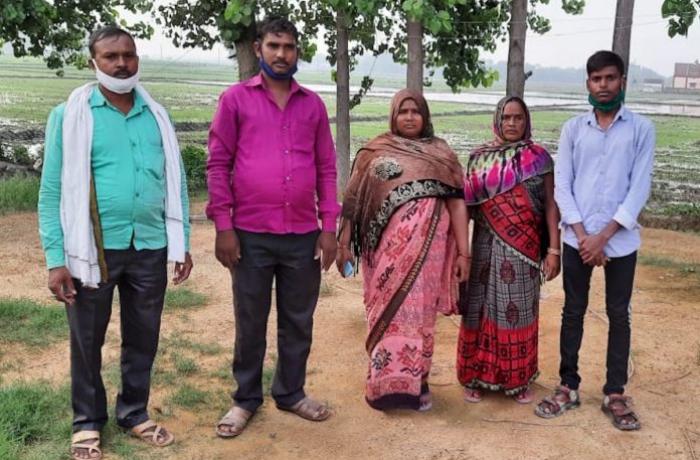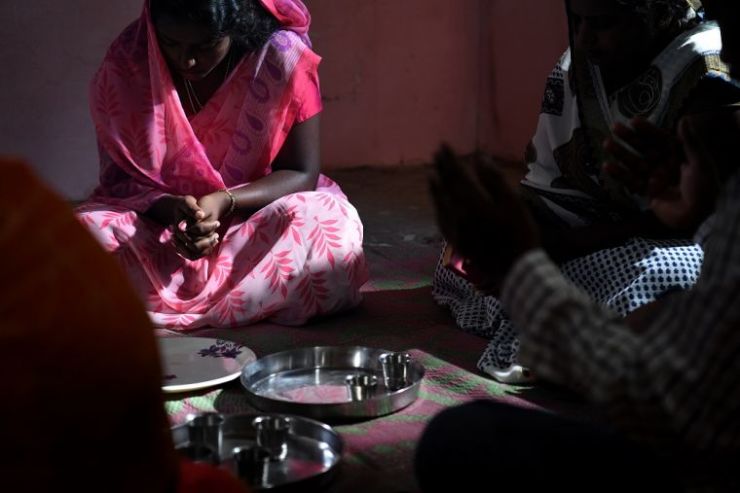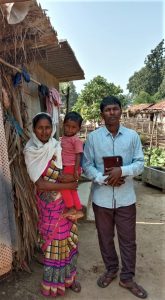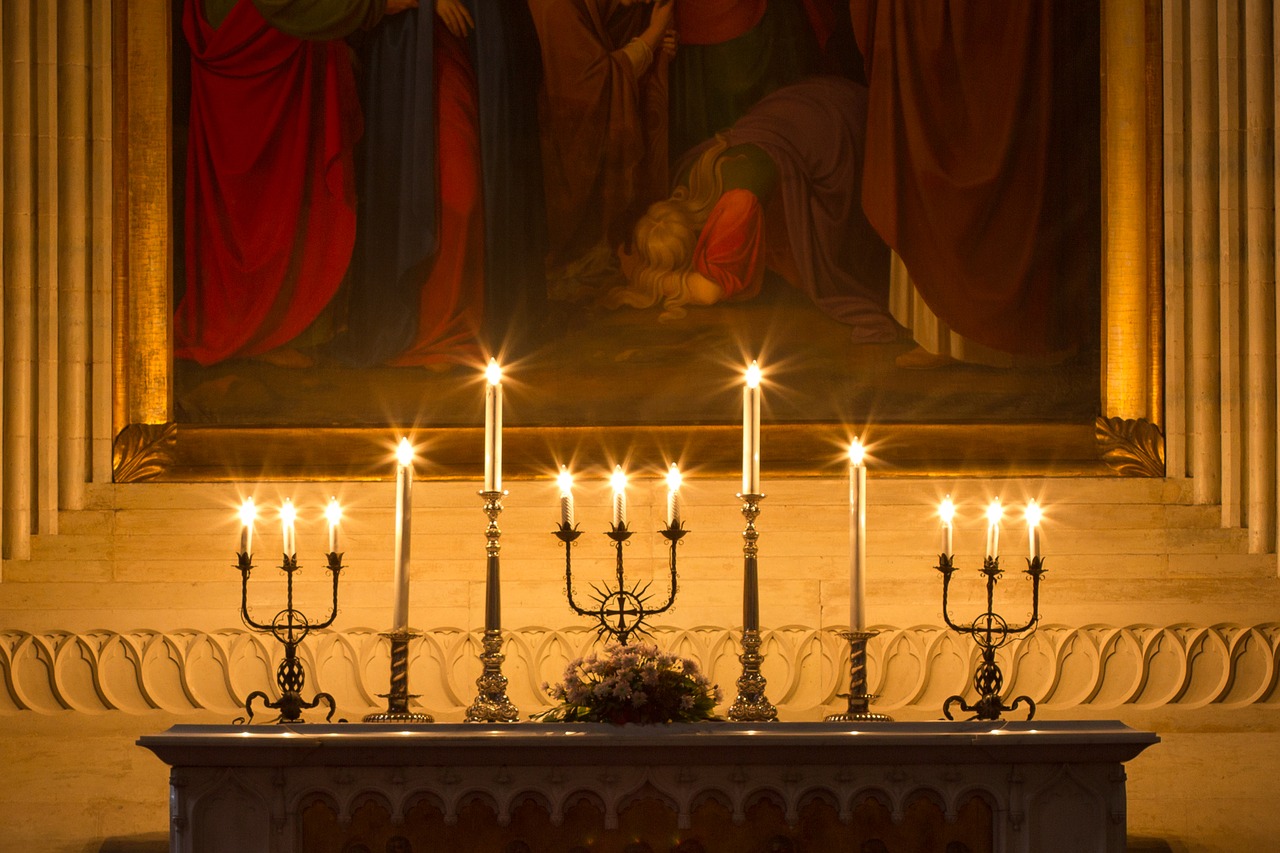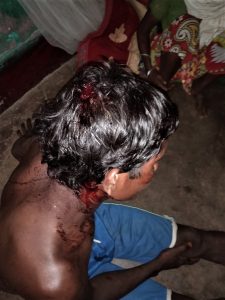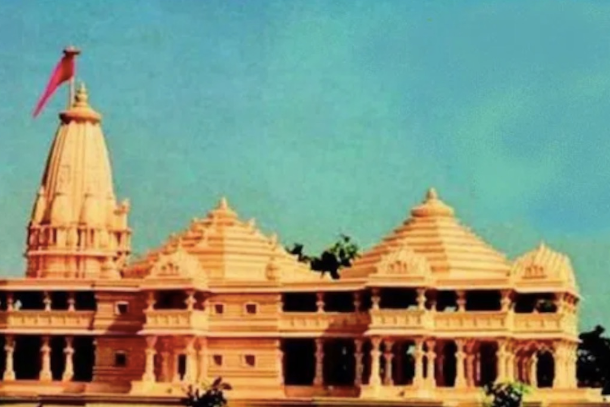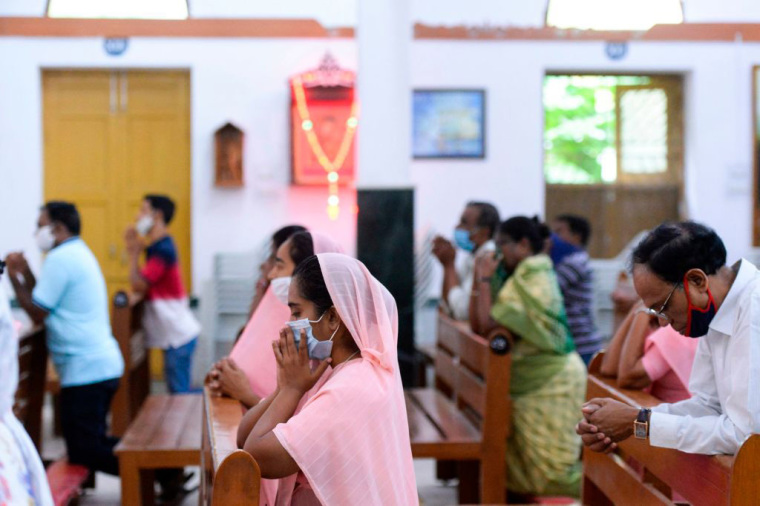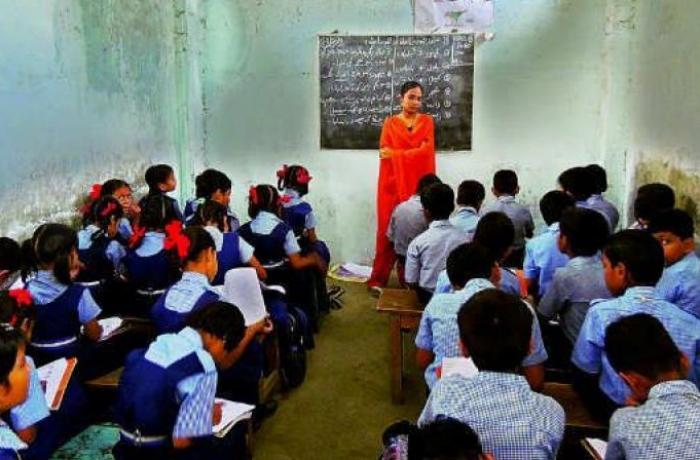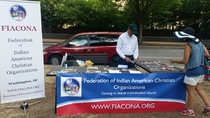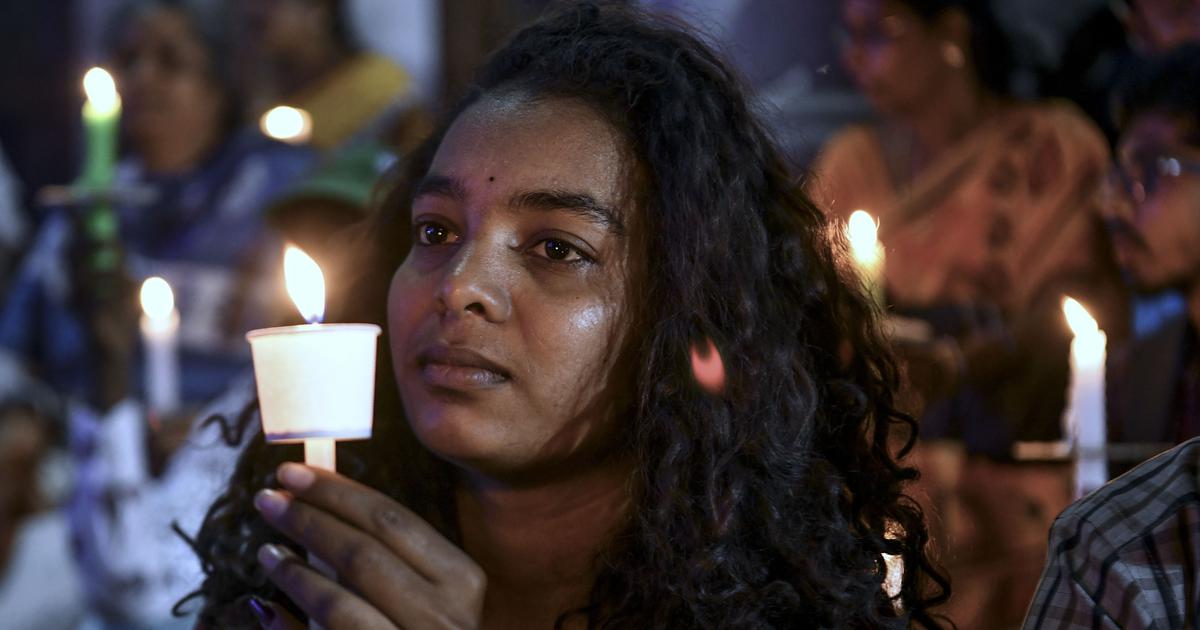Christian families attacked, threatened and forced to flee their village
A mob ransacked a young clergyman’s home. They threatened his family and two other Christian families that if they did not leave the village, their women would be raped, the men murdered, and their homes burnt. Police was forced to release two detainees. Hinduvta radicals attacked and mocked Rev Vikas Gupta (pictured right) in a remote village in Azamgarh district, Uttar Pradesh on 2 July, said Sajan K George, president of the Global Council of Indian Christians (GCIC). “Vikas Gupta, a 21-year-old man, was dragged inside a Hindu temple where he was forced to bow in front of an idol,” George told AsiaNews. After that, “he was paraded through the village market”. His attackers “also damaged his motorbike.” The following day another mob broke into his home in Dassmora, a village in Azamgarh district. They ransacked the house, and threatened his family and two other Christian families that if they did not leave the village, the women would be raped, the men murdered, and their homes set on fire. After the mob left, the families asked police for help. On 4 July, the mob attacked the house of prayer, tearing down walls, breaking windows and doors. Following the third attack, Christians informed the Bardah police
Persecuted, but not abandoned: How India’s Christians are staying strong despite opposition
"We are hard pressed on every side, but not crushed; perplexed, but not in despair; persecuted, but not abandoned; struck down, but not destroyed." (2 Cor 4:8, NIV) Life has been tough across India: Covid-19 has forced hundreds of millions of citizens into lockdown. For many of the nation's minority Christian population it has become a question of survival as they face discrimination and even violence. However, despite all this, millions of Indian Christians are remaining firm in their faith. "Christians are suffering even more than before," says Open Doors partner Brother Sam*, based in India. "Most of them have had to combat economic problems as well as opposition and hatred from their communities." But in the face of the worsening opposition, Christians in India appear to be unwavering in their faith and courageously living their lives for God. "The Lord's Spirit is really working powerfully," says Open Doors partner Sabita. "Persecution victims are standing strong and there are many people being healed and coming to faith." In one remote Indian village a church congregation managed to 'out-worship' a gang which was trying to intimidate them into silence. Brother Sam says: "One Sunday morning around 25 people barged into this church. "The men pulled the pastor down by his collar
Fourth Christian in Less than Two Months Killed in India
Maoists in Maharashtra state killed a church pastor on Friday (July 10), the fourth death of a Christian for their faith in India since late May, sources said. In Bhatpar village, Gadchiroli District in the western peninsular state, pastor Munshi Devu Tado was leading a worship service on his property for about 15 village families from 4 p.m. to 6 p.m. when three armed men and three women escorted him away, said his wife, Jaini Munshi Tado. “They shook hands with him at first, then took him by his hand and, after few steps, they tied his hands at his back with a rope,” she told Morning Star News. “I, my father-in-law and brother-in-law followed after them, pleading and enquiring as to why they are taking him. They said they just want to talk to him and that we need not worry, they will send him back in a little while.” Family members continued to follow until the Maoists forcibly stopped them and pushed them away, throwing them to the ground, Jaini Munshi Tado said. “Hardly five to seven minutes later, we heard a gunshot,” she said, weeping. “We immediately ran in the direction only to find the body of my husband in the
The Gutting Of Indian Democracy By Modi-Shah – by Ramachandra Guha
Back in December 2015, I wrote that India was in danger of becoming what I termed an 'election-only democracy'. Once a party had won an election, and formed a government, its leader(s) behaved as if they were totally immune from critical scrutiny, and could do absolutely what they wished for the next five years, when the next election was to be held. In a proper democracy, a democracy worth the name, the authoritarian tendencies of leaders elected to public office are kept in check by such institutions as a functioning parliament, a free press, an independent civil service, and an independent judiciary. That is how democracy functions in much of Western Europe and North America, and that is how the framers of our constitution hoped our democracy would function too. And so it largely did, for the first two decades after Independence. In her early years as Prime Minister, Indira Gandhi followed her predecessors Jawaharlal Nehru and Lal Bahadur Shastri in regularly attending debates in parliament; in keeping the civil service and judiciary free from political interference; and in not seeking to intimidate the press. But after she split the Congress in 1969, her attitude to these things changed. She began promoting a 'committed' judiciary
Christians in India Return to Village where Followers of Tribal Religion Attacked Them
Christian couple and their children were asleep in their beds in central India at 11 p.m. recently when villagers who follow the local tribal religion broke into their home and began beating them with wooden batons. The family of Bhima and Devi Markham fled from their home in Devkupli Para, Chhattisgarh state that night, May 20, to save their lives, an area pastor said. “They ran into the wilderness to hide while the assailants vandalized their belongings, throwing away the food grains in their homes,” pastor Ramdhar Kashyap told Morning Star News. The mob of 15 furious villagers went on to beat Christians Chenna Markham and Joga Kunjam and their families, along with an unidentified elderly Christian woman, driving them from their homes. “The three families including their children and the elderly sister, a total of 14 injured Christians, fled from Devkupli Para in different directions fearing for their lives,” Pastor Kahyap said. They journeyed about two miles on foot before reaching his church premises in Burdi village at about 3 a.m., he said. “They were profusely bleeding,” the pastor said. “I called 108 ambulance service in the wee hours and took them to the hospital.” Though villagers had persecuted the Christians for months, they attacked that
Modi pushes controversial temple to center stage of Indian politics
PM faces criticism for promoting construction of a Ram temple amid a pandemic and falling economy An architect's rendering of the proposed Ram temple in Ayodhya town in Uttar Pradesh. Prime Minister Narendra Modi is scheduled to join a foundation stone-laying ceremony on Aug. 5. (Photo: opindia.com) Indian Prime Minister Narendra Modi plans to visit a controversial temple site in a move that could boost his party's idea of making India a Hindu-only nation.Modi, known for his hardline politics, is expected to participate in the foundation stone-laying ceremony of the temple in northern India's Ayodhya town, considered the birthplace of Hindu lord Ram.A centuries-old dispute over a temple-mosque structure in Ayodhya was aggravated in 1992 when Hindu zealots demolished the structure. It triggered nationwide Hindu-Muslim riots, killing at least 2,000 people.Modi's pro-Hindu Bharatiya Janata Party (BJP) came to the political mainstream by demanding demolition of the 16th-century mosque built by Muslim ruler Babur. They claimed Muslims built the mosque after demolishing a temple and campaigned to destroy it and build a new Hindu temple at the site. The temple construction was part of the BJP's election promises but was delayed because of court cases over land ownership. In November 2019, India's Supreme Court ruled in favour of a Ram temple. The judges upheld
6 Christian families given ultimatum: Deny Jesus or flee
Catholic devotees wear face mask attend the Holy Mass at the Saint Joseph's Church on the first day after the reopening of religious services after the government eased restrictions imposed as a preventive measure against the COVID-19 coronavirus, in Hyderabad on June 8, 2020. NOAH SEELAM/AFP via Getty Images Police have ordered six Christian families to either renounce their faith or flee their homes after they reported being brutally attacked by a radical Hindu mob. Joginder Bhuya, a Christian, told persecution watchdog International Christian Concern that he reported the attack to the Latehar District Police station of Jharkhand state on July 5. But instead of filing a report, officers gave Bhuya an ultimatum, saying they must either convert back to Hinduism or abandon their homes and leave the village. "I thought the police are there to protect and serve justice, but the police spoke exactly what the religious fanatics have been telling us," Joginder said. Earlier, Hindu village leaders had convened a meeting to discuss the fate of Christian villagers who had refused to renounce their Christian faith. There, it was decided that the Christians would be chased out of their homes and the village if they didn't abandon their faith and "re-convert" to Hinduism. When the
Karnataka government tries to remove Islam and Christianity from school curriculum
Following an outcry against the proposal, the State’s Education Department issued a statement on Thursday, saying that “the decision to drop certain chapters has been put on hold. A review will be done, following which the deleted chapters will be uploaded to the website”. Mumbai (AsiaNews) – The BJP-led Government of Karnataka has put on hold a controversial proposal to drop certain chapters from social science textbooks to trim the 2020-21 curriculum for Grades 1 to 10 students. The sections to be removed covered Islam, Christianity, Tipu Sultan and his father, Hyder Ali. State authorities had initially decided to cut the 2020-21 syllabus because of the COVID-19 pandemic. Chapters on the Constitution, Islam and Christianity were left out of school curricula, various media reported. The rationale behind the move was that students would study these topics in Grade 9 anyway. However, media reports noted that Grade 9 teachers were asked to briefly summarise these topics since the syllabus erroneously claims that students already studied them in Grade 6. Speaking about the matter, Archbishop Peter Machado of Bangalore told AsiaNews that "India is a secular country blessed with a multi-religious heritage of tolerance and harmony. No other country can boast such a rich and interfaith fabric and
STATEMENT
Washington DC. August 04, 2020. The Federation of Indian American Christians organizations of North America (FIACONA), an advocacy group dedicated to the religious freedom of the minority Indian Christians in India strongly objects to the ill-advised celebration and gloating by extremist Hindutva supporters during the occasion of the laying of foundation for a controversial temple in a place called Ayodhya, in Northern India. The proposed temple construction is held on a site where a 500 year old mosque known as Babri Masjid was illegally tore down by extremist elements in 1992 causing the rioting and killing of thousands of people. The scheduled celebration is to take place in Times Square on August 5th, 2020, masquerading as a 'Bhoomi Pooja' for the proposed Ayodhya temple. The Hindutva supremacists groups in the U.S. who support Prime Minister Modi's policies of polarization and division have become so bold in their approach and so cavalier in their attitudes at a point where they are even ready and willing to promote policies so contradictory to the values and principles of their adopted land. By scheduling this celebration, they are conveying to the American public that trampling the rights of the minority religious populations such as Muslims, Christians, Dalits
Harsh Mander: With the Ayodhya ceremony, has the inclusive India of my dreams been lost forever?
Like a meteor in slow motion, it was only a matter of time that this would hit us. Even so, August 5, 2020, is a day of profound sadness and loss. History will remember it as the day on which the bumpy but colourful and often hopeful journey of India as a humane and inclusive republic of equal citizenship was formally halted by an incumbent government. A government of unmatched hubris, rooted in an ideology of Hindu supremacism, the complete reversal of the pledges that we the people of India made in our Constitution. Was this a tragedy foretold? From the moment when three bullets were pumped into the frail body of Mahatma Gandhi during his inter-faith prayer meeting on a winter afternoon in January 1948, was the ideology of his assassin bound to triumph eventually? Was it inevitable that the iridescent dream of building a country that one day would belong equally in every way to people of every faith, caste, class, gender, language, ethnicity, colour, sexuality and ability would be smashed? And has this dream been destroyed for generations to come? When the prime minister brusquely brushes aside all scruples of constitutional propriety by choosing to preside over a private





